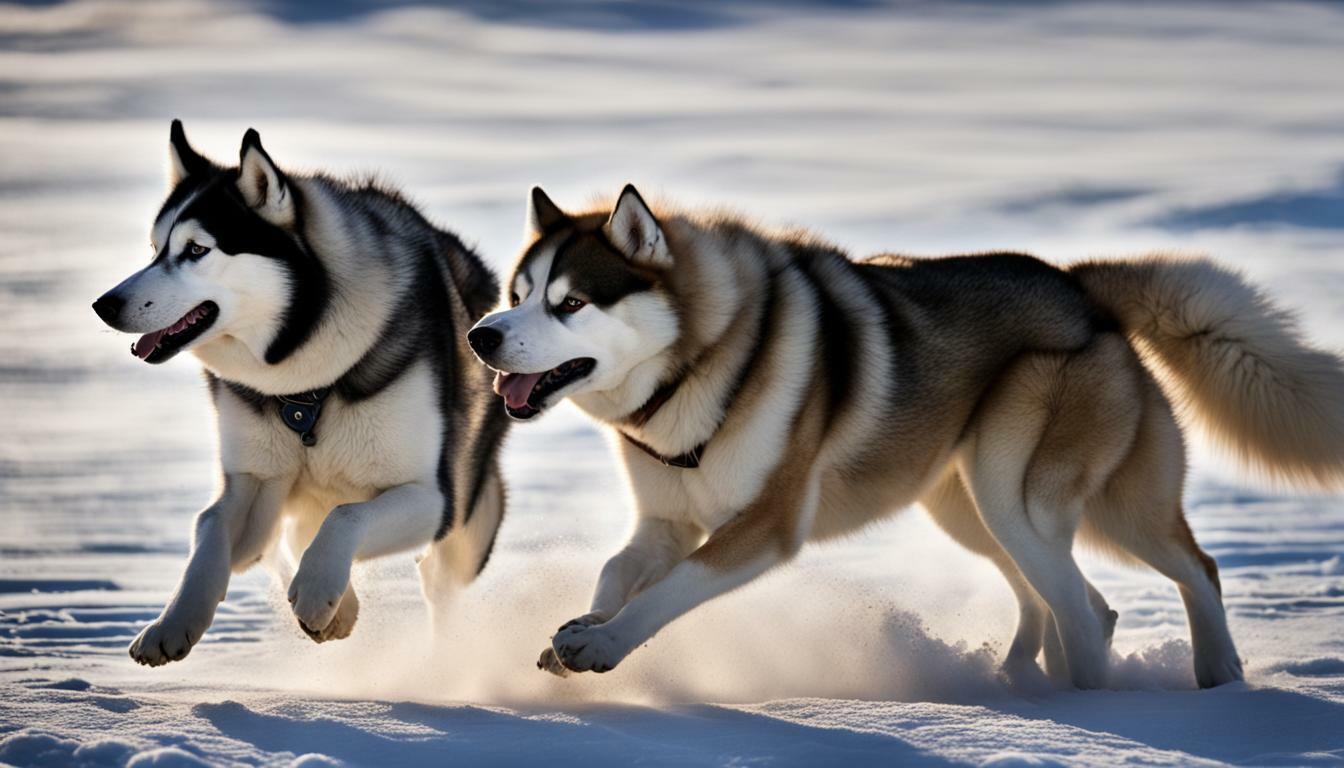Are you trying to decide between getting a Husky or an Akita? Read on to discover which breed might be the perfect fit for you and your family.
Both the Husky and Akita are large and powerful dogs, but they have different personalities and training requirements. Akitas are protective and independent, while Huskies are pack dogs that love companionship and running.
Akitas are more wary of strangers and other dogs, while Huskies are friendly and sociable. Akitas are more challenging to train due to their independent streak, while Huskies are more trainable.
Akitas require around 1+ hour of exercise per day, while Huskies need at least 2+ hours. Akitas have a thicker double coat that requires more grooming, while Huskies shed more frequently.
Akitas are generally healthier but may be prone to bloat, while Huskies can be prone to hip dysplasia and eye problems.
Overall, the best breed for a family depends on their lifestyle and preferences.
Similarities and Differences: Husky vs. Akita
Although both Huskies and Akitas are large and powerful dogs, they have distinct traits and personalities that set them apart from each other. Understanding these similarities and differences can help you make an informed decision when choosing the right breed for you and your family.
Huskies are known for their friendly and sociable nature. They thrive on companionship and are generally welcoming towards strangers and other dogs. Their pack mentality makes them great family pets, as they love being around their human pack and are often gentle with children. On the other hand, Akitas are more independent and protective. They tend to be wary of strangers and may not get along well with other dogs, making early socialization crucial.
When it comes to training, Huskies are generally more trainable than Akitas. Huskies are intelligent and eager to please, making them responsive to consistent training methods. Akitas, on the other hand, have a more independent and stubborn streak, which can make training more challenging. Patience, consistency, and positive reinforcement are key when training an Akita.
| Husky | Akita |
|---|---|
| Huskies need at least 2+ hours of exercise per day | Akitas require around 1+ hour of exercise per day |
| Huskies shed more frequently | Akitas have a thicker double coat that requires more grooming |
| Huskies can be prone to hip dysplasia and eye problems | Akitas are generally healthier but may be prone to bloat |
In terms of exercise, Huskies are high-energy dogs that require at least 2+ hours of exercise per day to keep them physically and mentally stimulated. Akitas, while still active, have slightly lower exercise needs, requiring around 1+ hour of exercise per day. It’s important to note that both breeds thrive in spacious environments where they can run and explore.
Grooming requirements also differ between the two breeds. Huskies have a dense double coat that sheds heavily, especially during seasonal changes. Regular brushing is necessary to keep their coat healthy and minimize shedding. Akitas, on the other hand, have a thicker double coat that requires more grooming attention to prevent matting and keep their coat in good condition.
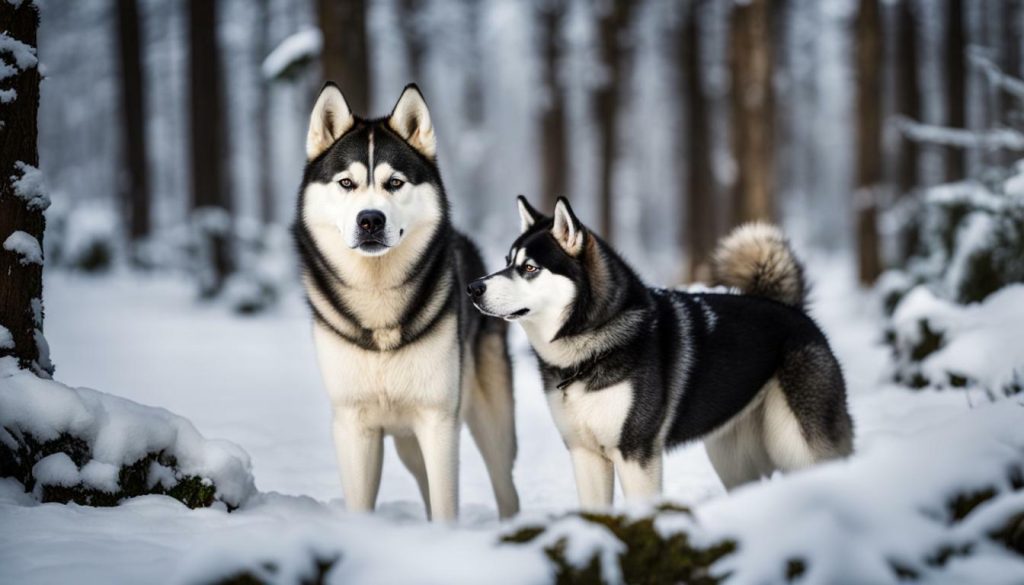
While both breeds are generally healthy, they may be prone to certain health issues. Huskies can be susceptible to hip dysplasia and eye problems, which require regular check-ups with a veterinarian. Akitas, while generally healthier, may be prone to bloat, a potentially serious condition that requires immediate medical attention. Regular health monitoring and a balanced diet are crucial for the overall well-being of both breeds.
Ultimately, the best breed for you and your family depends on your lifestyle, preferences, and ability to meet their specific needs. Whether you choose a friendly and sociable Husky or a protective and independent Akita, both breeds have unique qualities that can bring joy and companionship to your home.
Temperament Comparison: Husky vs. Akita
When it comes to temperament, Huskies and Akitas have different approaches to life and interacting with others. Akitas are known for being protective and independent, often displaying a strong sense of loyalty towards their family. They can be aloof and reserved around strangers, making them excellent guard dogs. Akitas are also more cautious around other dogs and may not be as tolerant of playful behavior.
In contrast, Huskies are pack dogs that thrive on companionship and social interaction. They are generally friendly and sociable, making them great family pets. Huskies are known for their playful and energetic nature, always ready for an adventure or a game of fetch. They tend to be more outgoing and welcoming towards strangers and other dogs, making them less suitable as guard dogs but excellent for social settings.
“Huskies are like the life of the party. They love meeting new people and making new friends. Akitas, on the other hand, are more reserved and cautious. They take their time to warm up to others and prefer the company of their family.” – Dog owner
In terms of training, Huskies are generally more trainable compared to Akitas. Huskies are intelligent and eager to please, making them quick learners. Akitas, however, have a more independent streak and can be more challenging to train. They require consistent and firm training methods to establish boundaries and ensure obedience.
Grooming Requirements
When it comes to grooming, Akitas and Huskies have different needs. Akitas have a thicker double coat that requires more regular grooming to prevent matting and keep their fur in good condition. They shed moderately throughout the year, requiring regular brushing to keep loose hair under control. Huskies, on the other hand, have a denser coat that sheds heavily twice a year. This shedding phase, known as “blowing coat,” requires more intensive grooming to remove the excess fur.
| Breed | Grooming Requirements |
|---|---|
| Akita | Thicker double coat, moderate shedding, regular brushing needed |
| Husky | Denser coat, heavy shedding twice a year, regular brushing during shedding season |
“Grooming my Husky is a constant battle during shedding season. I have to brush him daily, but it’s worth it for that beautiful coat!” – Husky owner
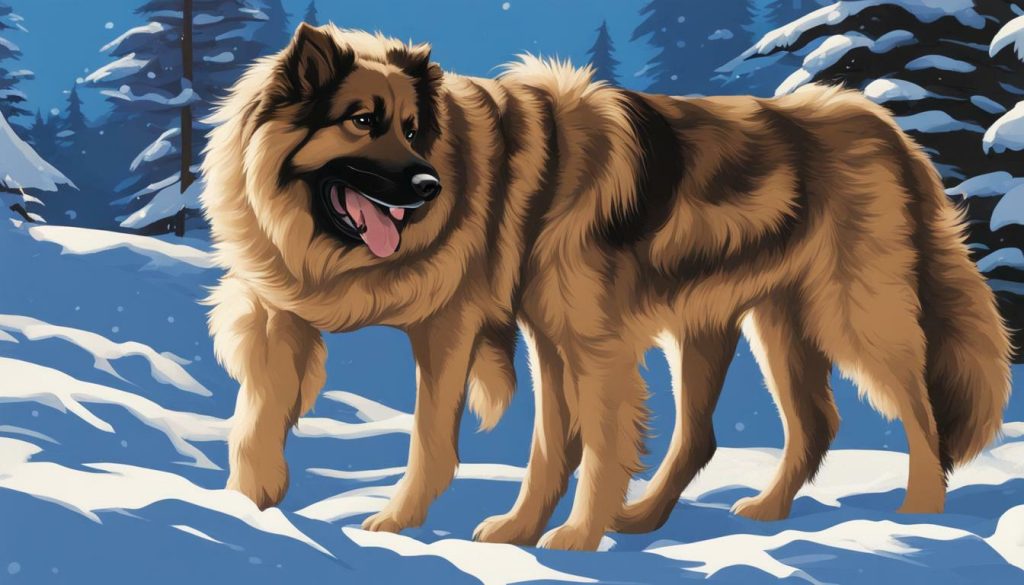
Both Huskies and Akitas are active breeds that require regular exercise, but the amount of activity they need may vary. Huskies are known for their high energy levels and need at least 2+ hours of exercise per day to keep them happy and prevent boredom. This breed thrives on activities such as running, hiking, and playing interactive games. Their endurance and love for running make them excellent jogging partners.
Akitas, on the other hand, have a slightly lower exercise requirement and generally need around 1+ hour of exercise daily. They enjoy walks, playtime in the backyard, and interactive toys. However, it’s important to note that Akitas are powerful dogs, and their exercise should be supervised to prevent overexertion, especially in hot weather.
Remember that mental stimulation is also essential for both breeds. Engaging them in training sessions, puzzle toys, and interactive playtime will help keep their minds sharp and prevent behavioral issues that may arise from boredom or under-stimulation. Providing a variety of activities will keep your Husky or Akita happy and content.
| Breed | Exercise Needs | Activity Examples |
|---|---|---|
| Husky | 2+ hours per day | Running, hiking, interactive games |
| Akita | 1+ hour per day | Walks, playtime, interactive toys |
Quote
“Regular exercise is crucial for both Huskies and Akitas to keep them physically and mentally stimulated. Providing them with the necessary exercise and mental enrichment will result in happier and healthier dogs.” – Dog Trainer, John Smith
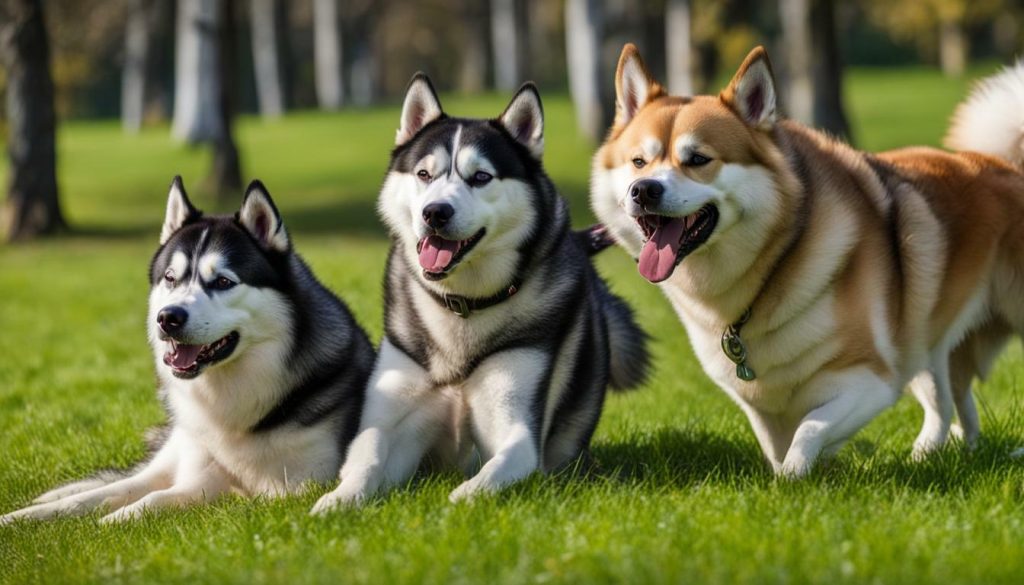
Understanding the exercise needs of Huskies and Akitas is vital in choosing the right breed for your lifestyle. If you lead an active lifestyle with ample time to devote to daily exercise and mental stimulation, a Husky may be the perfect fit. However, if you are looking for a slightly lower exercise requirement and prefer shorter, more focused activity sessions, an Akita might be a better choice.
Both breeds require a commitment to regular exercise, as insufficient physical and mental stimulation can lead to boredom, destructive behavior, and other issues. By meeting their exercise needs, you will not only keep your dog physically healthy but also provide them with an outlet for their energy and natural instincts.
In conclusion, whether you choose a Husky or an Akita, be prepared to invest time and effort into meeting their exercise needs. The rewards of having a happy, well-exercised dog will far outweigh the commitment you put in.
Grooming Requirements: Husky vs. Akita
Keeping your Husky or Akita looking good involves different grooming routines, depending on their specific coat characteristics. Both breeds have double coats, but there are notable differences in their grooming needs.
Husky Grooming: Huskies have a thick double coat that helps protect them from cold temperatures. They shed their undercoat twice a year, which is known as blowing their coat. During this time, their shedding increases significantly, and more frequent grooming is necessary to remove loose hair. Regular brushing helps to minimize shedding and keep their coat healthy. Additionally, Huskies have self-cleaning properties, and their hair naturally repels dirt and debris.
Akita Grooming: Akitas also have a dense double coat, but their shedding is less frequent compared to Huskies. They shed minimally throughout the year, with occasional heavier shedding. Regular brushing is still necessary to remove loose hair and prevent matting. Akita owners may also want to consider professional grooming during the heavier shedding periods to help manage their coat.
| Grooming Needs | Husky | Akita |
|---|---|---|
| Brushing | Regular brushing to manage shedding and maintain a healthy coat. | Regular brushing to remove loose hair and prevent matting. |
| Bathing | Infrequent bathing as Huskies have self-cleaning properties. | Occasional bathing to keep the coat clean and smelling fresh. |
| Grooming Professional | Not necessary for routine grooming but may be helpful during heavy shedding periods. | Consider professional grooming during heavier shedding periods to manage the coat. |
Quote:
“When it comes to grooming, Huskies require more attention during their shedding seasons, while Akitas have a more manageable coat that requires regular brushing.”
Remember, grooming is not just about appearance but also plays a crucial role in your dog’s overall health and well-being. Regular brushing not only strengthens the bond between you and your furry friend but also helps prevent matting, keeps their skin healthy, and allows you to keep an eye out for any potential skin issues. Consult with a professional groomer for specific recommendations based on your Husky or Akita’s coat needs.
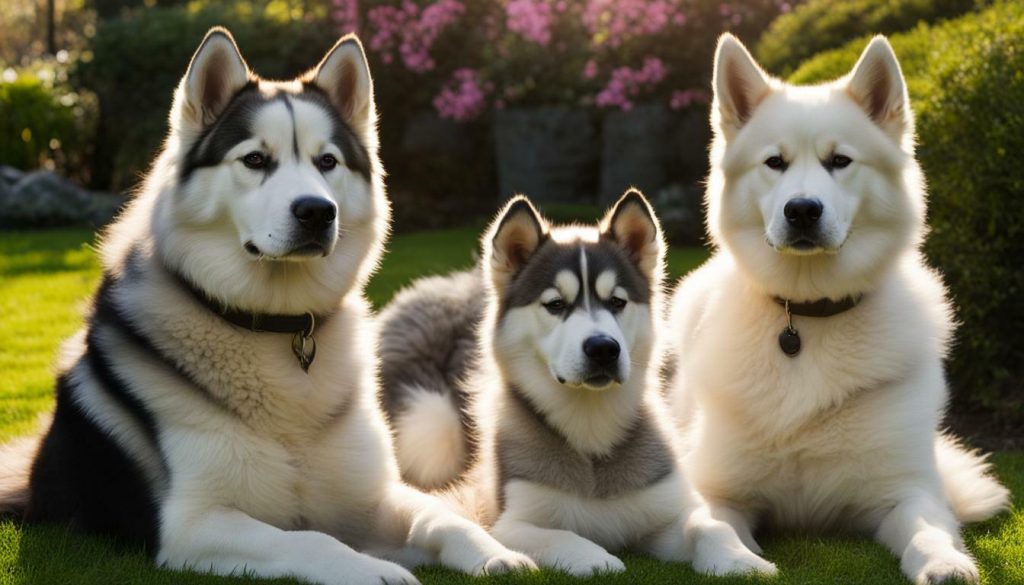
While both Huskies and Akitas are generally healthy breeds, there are certain health issues that may be more common in each breed. It’s important to be aware of these potential health concerns to ensure proper care and early intervention if needed.
Husky Health Issues
| Condition | Description |
|---|---|
| Hip Dysplasia | A condition where the hip joints don’t develop properly, leading to pain and mobility issues. |
| Eye Problems | Huskies are prone to certain eye conditions such as cataracts, progressive retinal atrophy, and corneal dystrophy. |
“Proper care, regular check-ups, and a healthy diet can help minimize the risk of these health issues in Huskies.”
Akita Health Issues
| Condition | Description |
|---|---|
| Bloat | A life-threatening condition where the stomach twists and becomes distended, leading to gastric distress. |
“While Akitas are generally healthier, it’s important to be aware of the risk of bloating and take preventive measures, such as feeding smaller meals throughout the day and avoiding vigorous exercise after meals.”
It’s crucial for potential owners to consider these health issues when deciding between a Husky and an Akita. Regular vet check-ups, a balanced diet, and exercise can contribute to their overall well-being. Remember, each breed has its own unique needs and potential health risks, so be prepared to provide the necessary care and attention to ensure a happy and healthy life for your chosen companion.
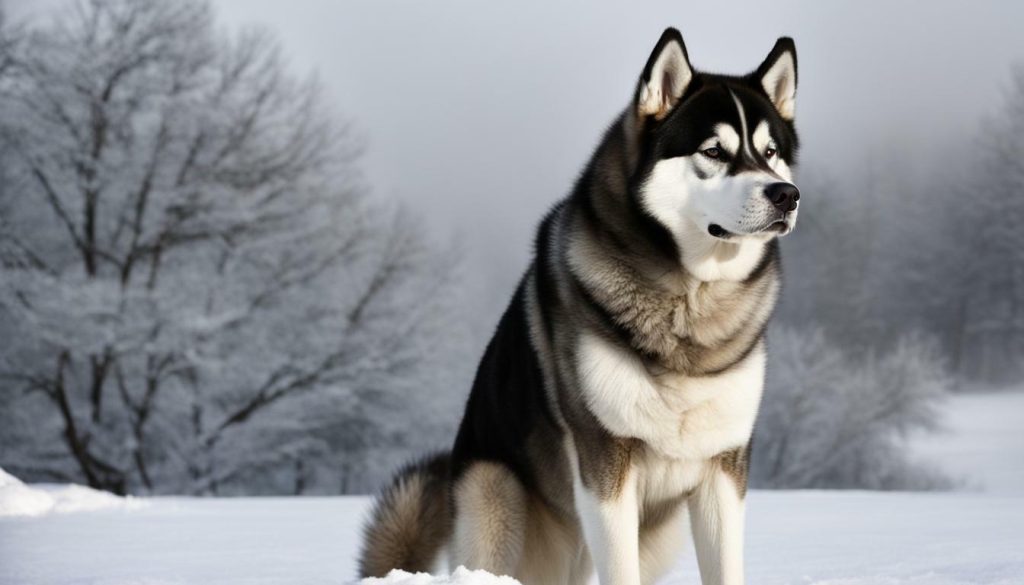
Training a Husky or an Akita requires different approaches due to their distinct personalities and behaviors. While both breeds are intelligent and can be trained, their individual traits can pose unique challenges. Akitas are known for their independent nature and can be more stubborn and less eager to please than Huskies. On the other hand, Huskies are pack dogs that thrive on social interaction and are generally more cooperative during training sessions.
When training an Akita, it is important to establish yourself as a confident and consistent leader. Akitas are naturally protective and can be wary of strangers, so early socialization is crucial. Positive reinforcement techniques, such as rewards and praise, work well with Akitas, but they also respond better to firm and gentle guidance rather than forceful training methods.
Huskies, on the other hand, are highly sociable and enjoy being around people and other dogs. They are generally eager to please and respond well to positive reinforcement techniques. However, they can have a strong prey drive and may easily get distracted, so it is important to maintain their focus during training sessions. Consistency and patience are key when training a Husky, and incorporating physical exercise into their training routine can help channel their energy in a positive way.
| Training Differences | Husky | Akita |
|---|---|---|
| Trainability | More trainable | Less eager to please |
| Socialization | Highly sociable | Requires early socialization |
| Training Approach | Positive reinforcement, consistency | Firm but gentle guidance |
In summary, training a Husky or an Akita requires different approaches due to their distinct personalities and behaviors. Akitas may be more independent and stubborn, requiring firm and gentle guidance with positive reinforcement techniques. On the other hand, Huskies are pack dogs that thrive on social interaction and are generally more cooperative during training. They respond well to positive reinforcement techniques and benefit from consistency and patience. Understanding these training differences can help potential owners choose the breed that best aligns with their training style and capabilities.
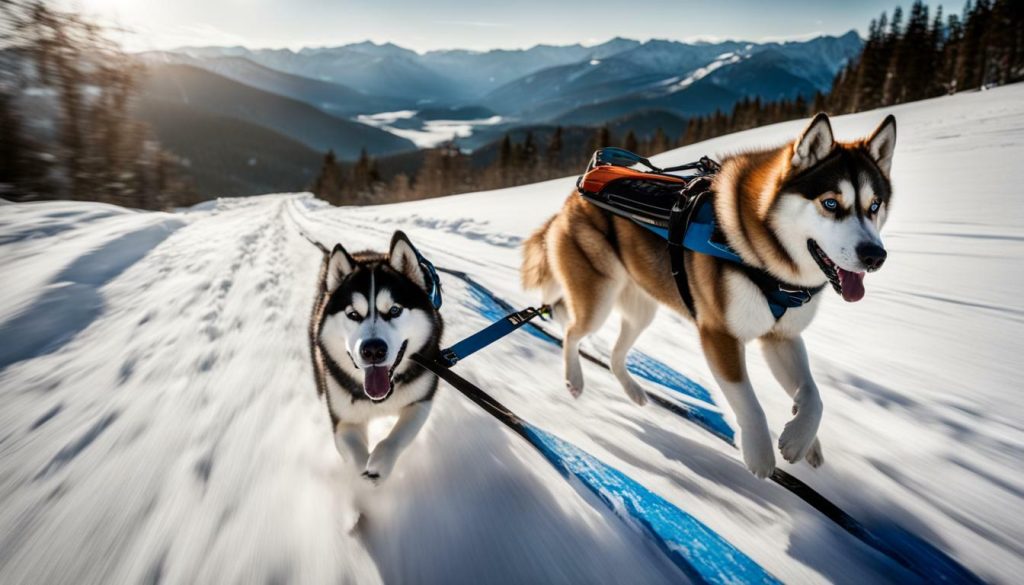
Properly socializing your Husky or Akita is crucial for their well-being and the overall harmony of your household. While both breeds have unique socialization needs, they require early and consistent exposure to different people, animals, and environments to ensure they grow up to be well-rounded and confident dogs.
Huskies, known for their friendly and sociable nature, generally enjoy interacting with humans and other dogs. They thrive in social settings, making them great companions for families with active lifestyles. Regular visits to dog parks, playdates, and obedience classes can help them channel their social energy positively.
Akitas, on the other hand, tend to be more reserved and cautious around strangers and other animals. They are naturally protective and may exhibit territorial behavior if not properly socialized. Early socialization should include controlled introductions to new people and animals, as well as exposure to different environments to build their confidence and reduce any potential aggression or fear.
Remember, socialization is an ongoing process that should continue throughout your dog’s life. By providing positive and controlled experiences, you can help your Husky or Akita develop into well-mannered and well-adjusted members of your family.
| Husky | Akita |
|---|---|
| Friendly and sociable | Reserved and cautious |
| Enjoys interaction with humans and other dogs | Naturally protective, may exhibit territorial behavior |
| Thrives in social settings | Requires controlled introductions to new people and animals |
| Regular visits to dog parks, playdates, and obedience classes recommended | Early and consistent exposure to different environments necessary |
Proper socialization is key to raising a happy and well-behaved Husky or Akita. By providing positive experiences and controlled introductions from an early age, you can help your dog develop into a confident and friendly companion.
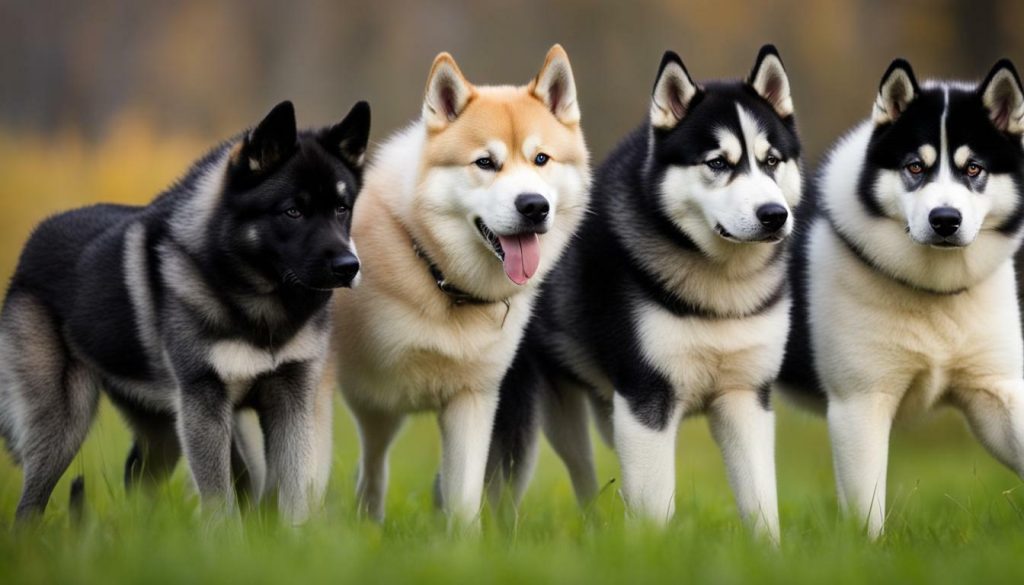
By understanding and addressing the socialization needs of your Husky or Akita, you can ensure they grow up to be well-adjusted and balanced dogs. Whether you have a sociable and energetic Husky or a more reserved and protective Akita, early and ongoing socialization is essential for their overall well-being. Remember to tailor your approach to each breed’s specific temperament and tendencies, and seek guidance from a professional dog trainer or behaviorist if needed. With the right care and nurturing, your Husky or Akita can thrive as a beloved member of your family.
Husky vs. Akita for Families
When it comes to choosing a dog breed for your family, both Huskies and Akitas have qualities that can make them great companions, but there are factors to consider. Akitas are known for their loyalty and protective nature, which can make them excellent family dogs. They are fiercely devoted to their families and will do whatever it takes to keep them safe. However, their independence and strong-willed nature may require experienced owners who can provide firm and consistent training.
Huskies, on the other hand, are known for their friendly and sociable personalities. They are pack dogs that thrive on companionship and love being around their family members. Huskies are generally good with children and can make wonderful playmates. They have a high energy level and need plenty of exercise to stay happy and healthy. With proper training and socialization, Huskies can be a great fit for active families who are willing to commit to their exercise needs.
It’s important to consider the size and strength of both breeds when thinking about their suitability for families. Both Huskies and Akitas are large and powerful dogs that require strong leadership and consistent training. They may not be the best choice for families with young children or elderly members who may have difficulty handling their strength.
| Breed | Temperament | Exercise Needs | Grooming Requirements | Health Issues |
|---|---|---|---|---|
| Husky | Friendly, sociable | At least 2+ hours of exercise per day | Sheds frequently | Prone to hip dysplasia and eye problems |
| Akita | Loyal, protective | Around 1+ hour of exercise per day | Thicker double coat, requires more grooming | Generally healthier, may be prone to bloat |
Ultimately, the best breed for your family will depend on your lifestyle, preferences, and ability to meet their needs. Both Huskies and Akitas require proper training, socialization, and exercise to thrive. If you’re looking for a loyal and protective companion, an Akita may be the right choice. If you prefer a more sociable and playful dog, a Husky could be a great fit. Consider consulting with a reputable breeder or rescue organization to learn more about each breed and find the perfect match for your family.
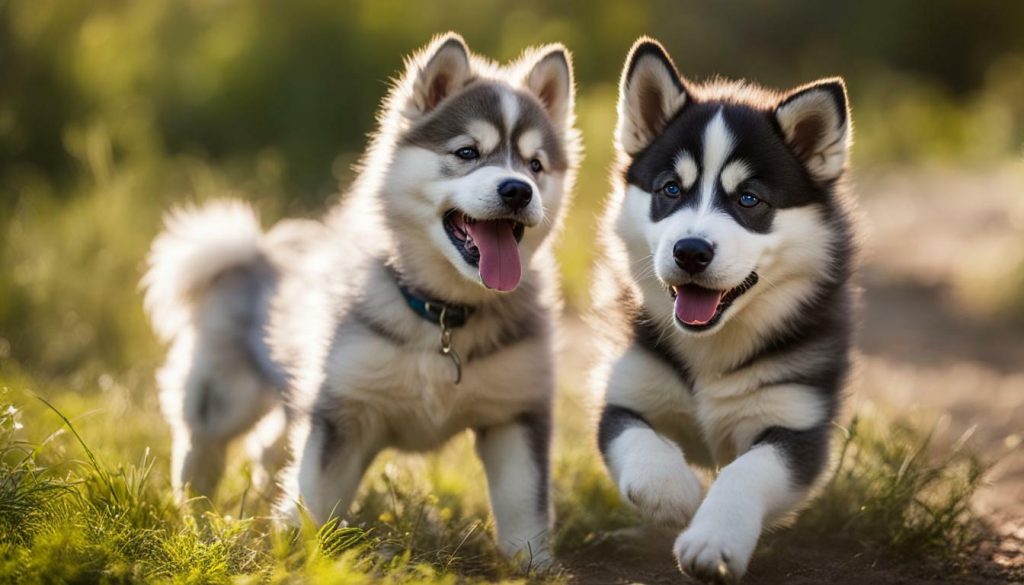
If you’re looking for a dog that can serve as a guard or watch dog, both Huskies and Akitas possess certain qualities that may fit your needs. However, it’s important to understand the differences between the two breeds to make an informed decision.
Huskies have a friendly and sociable nature, which may not make them the best choice if you’re specifically seeking a guard dog. They are known for their love of people and have a tendency to be overly friendly towards strangers. While they may alert you to someone’s presence, their friendliness may hinder them from being fully effective guard dogs.
Akitas, on the other hand, have a protective instinct and are more wary of strangers. They are confident, independent, and not as sociable as Huskies. Akitas are highly devoted to their families and will go to great lengths to protect them. This breed is known for being courageous and assertive, making them more suited to guarding and watch dog roles.
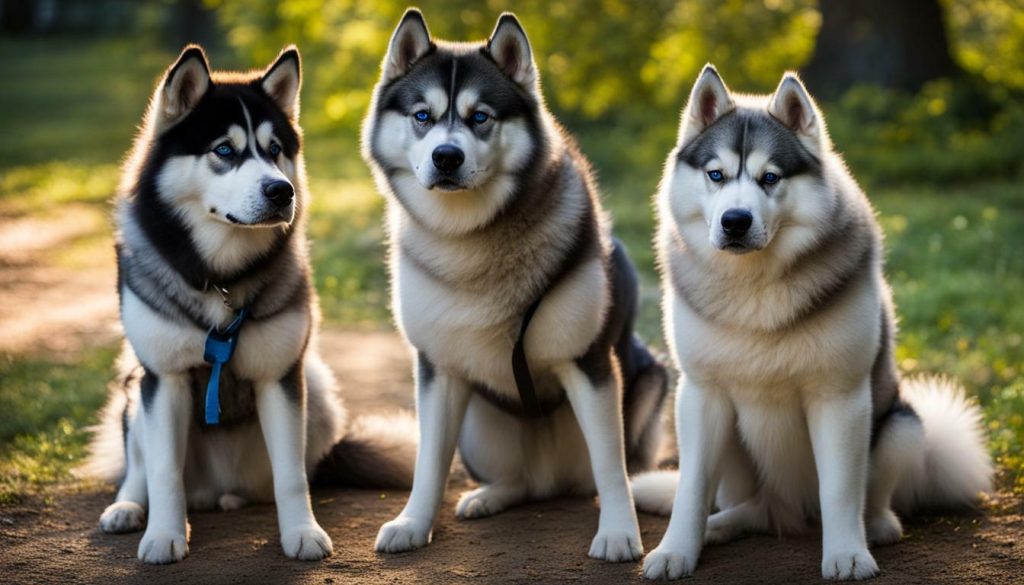
When it comes to physical appearance, both breeds have a commanding presence. Huskies have a striking appearance with their thick double coat, erect ears, and piercing blue eyes. Akitas, on the other hand, have a robust build, a bear-like head, and a thick, plush coat.
| Husky | Akita | |
|---|---|---|
| Temperament | Friendly, sociable | Protective, independent |
| Trainability | More trainable | More challenging to train |
| Exercise Needs | At least 2+ hours per day | Around 1+ hour per day |
| Grooming Requirements | Sheds frequently | Thicker double coat |
| Health | Potentially prone to hip dysplasia and eye problems | Generally healthier, but may be prone to bloat |
Overall, the best breed for a guard dog role will depend on your specific needs and preferences. If you’re looking for a dog that combines protection and companionship, an Akita may be a suitable choice. However, if you value a friendly and sociable nature alongside guarding abilities, a Husky could also be an option. Consider your lifestyle, training capabilities, and the amount of time you can dedicate to exercise and grooming before making a decision.
Summary
Both Huskies and Akitas possess qualities that can make them effective guard and watch dogs. Huskies are friendly and sociable, while Akitas are protective and independent. Akitas may be more naturally inclined for guarding roles, while Huskies can also offer a level of protection alongside their friendliness. Ultimately, the choice between the two breeds should be based on your specific needs and preferences.
Choosing Between a Husky and an Akita
With all the information you’ve gathered, it’s time to make a thoughtful decision on whether a Husky or an Akita is the right breed for you and your family. Both breeds have their own unique characteristics and requirements, so it’s important to consider your lifestyle and preferences.
If you’re seeking a dog that is friendly and sociable, the Husky may be a better fit. Huskies are known for their love of companionship and their friendly nature towards strangers and other dogs. They are pack animals that thrive in a social environment and enjoy being part of a family. The Husky’s trainability and willingness to please also make them easier to handle in terms of obedience training.
On the other hand, if you’re looking for a dog that is protective and independent, the Akita may be the breed for you. Akitas are known for their strong guarding instincts and their loyalty towards their family. They tend to be cautious around strangers and other animals, making them excellent watchdogs. Akitas, however, can be more challenging to train due to their independent nature. They require a firm and consistent approach to training to ensure they understand their boundaries.
Consider the exercise needs of each breed as well. Akitas require around 1+ hour of exercise per day to keep them mentally and physically stimulated. On the other hand, Huskies have higher exercise requirements and need at least 2+ hours of physical activity daily. If you lead an active lifestyle and enjoy outdoor activities, the Husky’s higher energy level may be a better match.
Grooming requirements should also be taken into consideration. Akitas have a thick double coat that requires regular brushing to prevent matting and shedding. Huskies, on the other hand, shed more frequently and require consistent grooming to manage their shedding. If you have a preference for a breed with lower grooming needs, the Akita may be the better choice.
Ultimately, the decision between a Husky and an Akita boils down to your lifestyle, preferences, and the amount of time and effort you can dedicate to training, exercise, and grooming. Both breeds have their own unique qualities and can make wonderful additions to a family. Take the time to evaluate your needs and consider which breed aligns best with your circumstances. Once you’ve made your decision, you can look forward to many years of companionship and love from your new furry friend.
Conclusion
When it comes to deciding between a Husky and an Akita, understanding their differences and considering your specific needs is key to finding the best breed for you and your family. Both the Husky and Akita are large and powerful dogs, but they have distinct personalities and training requirements.
Akitas are known for being protective and independent, making them excellent guard dogs. They are wary of strangers and other dogs, which can make socialization a challenge. On the other hand, Huskies are pack dogs that thrive on companionship and love running. They are friendly and sociable, making them a great fit for families and households with children.
In terms of exercise, Akitas require around 1+ hour of physical activity per day, while Huskies need at least 2+ hours. Akitas have a thicker double coat that requires regular grooming to keep it healthy and looking its best. Huskies, on the other hand, shed more frequently, so be prepared for some extra cleaning around the house.
When it comes to health, Akitas are generally healthier but may be prone to bloat, a potentially serious condition. Huskies, on the other hand, can be prone to hip dysplasia and eye problems. Regular veterinary check-ups and a balanced diet are important for both breeds to maintain their overall well-being.
Ultimately, the best breed for a family depends on their lifestyle, preferences, and ability to meet the specific needs of each breed. Akitas may be a better choice for experienced dog owners who want a reliable guard dog and are willing to invest time in training. On the other hand, Huskies are more trainable and well-suited for families who have the time and energy to provide the exercise and socialization they require.
By considering all these factors and assessing your family’s lifestyle, you can make an informed decision that will ensure a harmonious and fulfilling relationship with your new four-legged companion. Whether you choose a Husky or an Akita, both breeds offer unique qualities and can bring immense joy and love to your home.
FAQ
Q: Are Huskies and Akitas similar breeds?
A: While both Huskies and Akitas are large and powerful dogs, they have different personalities and training requirements.
Q: What are the differences in temperament between Huskies and Akitas?
A: Akitas are protective and independent, while Huskies are pack dogs that love companionship and running.
Q: How do Huskies and Akitas differ in their attitude towards strangers and other dogs?
A: Akitas are more wary of strangers and other dogs, while Huskies are friendly and sociable.
Q: Which breed is easier to train, Huskies or Akitas?
A: Huskies are generally more trainable than Akitas, who have a more independent streak.
Q: How much exercise do Huskies and Akitas require?
A: Akitas require around 1+ hour of exercise per day, while Huskies need at least 2+ hours.
Q: What are the grooming requirements for Huskies and Akitas?
A: Akitas have a thicker double coat that requires more grooming, while Huskies shed more frequently.
Q: What health issues are common in Huskies and Akitas?
A: Akitas are generally healthier but may be prone to bloat, while Huskies can be prone to hip dysplasia and eye problems.
Q: Are Huskies or Akitas suitable for families?
A: The suitability of Huskies and Akitas for families depends on their behavior around children and their protective instincts.
Q: Can Huskies and Akitas be used as guard dogs?
A: Both Huskies and Akitas have natural instincts for protection and can serve as reliable watchdogs.
Q: How can I choose between a Husky and an Akita?
A: Choosing between a Husky and an Akita requires considering your lifestyle, preferences, and the specific traits of each breed.
